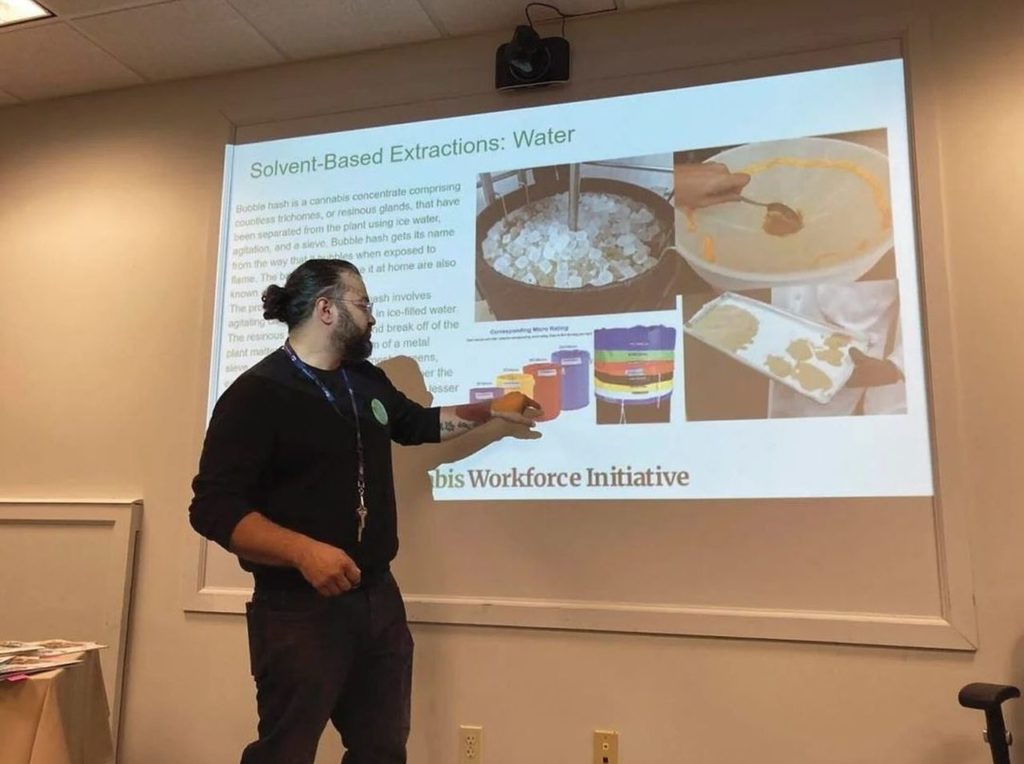As the Empire State’s legal adult-use cannabis market starts opening, a group providing training on the marijuana industry is trying to get as many New Yorkers as possible to consider a career in weed.
The New York State Cannabis Workforce Initiative – a partly state-funded collaborative effort of the nonprofit Workforce Development Institute and Cornell University’s School of Industrial & Labor Relations – has trained about 250 people on the basics of the cannabis industry since the fall, said David Serrano, CWI’s project manager.
“I’m very grateful to live in a state where our elected officials see a need for this education, and address it in a way that no other state has ever addressed cannabis and the workforce,” Serrano said. “This, to me, is the delivery of workforce equity for folks that are coming from impacted communities.”
Serrano, a service-disabled Navy veteran who’s worked in the legal cannabis industry across the country, said that he and other leaders of the joint project are connecting people with the educational and training resources they need to be successful in the legal weed market.
His experience in the cannabis industry began in the legacy market, Serrano said, but he moved to Colorado in 2013 to work in that state’s legal sector. Since then, he has worked for multiple companies in the regulated weed industry, including as founder and chief of business development for Harvest 360, a consulting firm for marijuana entrepreneurs.
CWI is using a two-pronged approach to cannabis education with expertise from Cornell and the Workforce Development Institute. WDI is creating training focused on industry education, while Cornell is providing information about worker rights and employers’ legal responsibilities.
It’s important that state residents – especially people from communities negatively affected by the War on Drugs – learn about the industry, since it could create about 30,000 decent-paying jobs across the state, Serrano said. A study conducted by economic policy and labor market researchers in 2021 was even more optimistic, predicting the industry could eventually employ nearly 51,000 people in New York State and generate $2.2 billion in annual employee compensation.Since the initiative launched in late-2021, its work has been partly funded by a $250,000 budget allocation from New York’s state legislature.
The group is currently offering a 15-hour training program that covers the basics of the cannabis industry for beginners, Serrano said. The program is free to all New Yorkers, and provides a glimpse of how the seed-to-sale supply chain works, elementary plant science, labor laws and more. Training is available via in-person classes, live online sessions and self-directed online courses, Serrano said. On Jan. 25, Serrano will start teaching a 10-week course via Zoom.
“This isn’t an in-depth skills development course, this is an educational overview of the opportunities,” Serrano said. “That’s our mission: to illuminate the opportunities.”
Much of the course content comes from information Cornell and WDI staffers gathered in a series of public meetings. WDI began hosting virtual community forums with Cornell through the nonprofit’s 10 regional offices toward the end of 2021. They used these events both to generate interest in cannabis jobs and learn about what CWI’s introduction course should teach.
Esta Bigler, who leads the labor and employment law program at Cornell’s ILR and is heading up the legal education portion of CWI, has also been conducting a nationwide survey of cannabis business owners to figure out which kinds will likely be most prominent in the New York market, and the kind of labor law education that business owners will need.
To date, members of CWI have engaged with more than 20 community organizations, supported over 40 educational community events, which were attended – mostly virtually – by some 7,000 people, Serrano said.
It’s still early for New York’s legal adult-use industry, especially when it comes to developing the workforce that will staff retail shops, cultivation and processing operations and other parts of the weed supply chain, so introducing as many state residents to the basics of marijuana commerce is critical.
However, Serrano said the group may eventually expand the kinds of trainings it provides, as the industry matures and people seek more specialized knowledge about the market.
“There is going to be a time where [our current training content] will not be enough,” Serrano said. “We’re certainly prepared and ready to dive deeper into skills development, in all of the areas.”
H/T: www.syracuse.com




